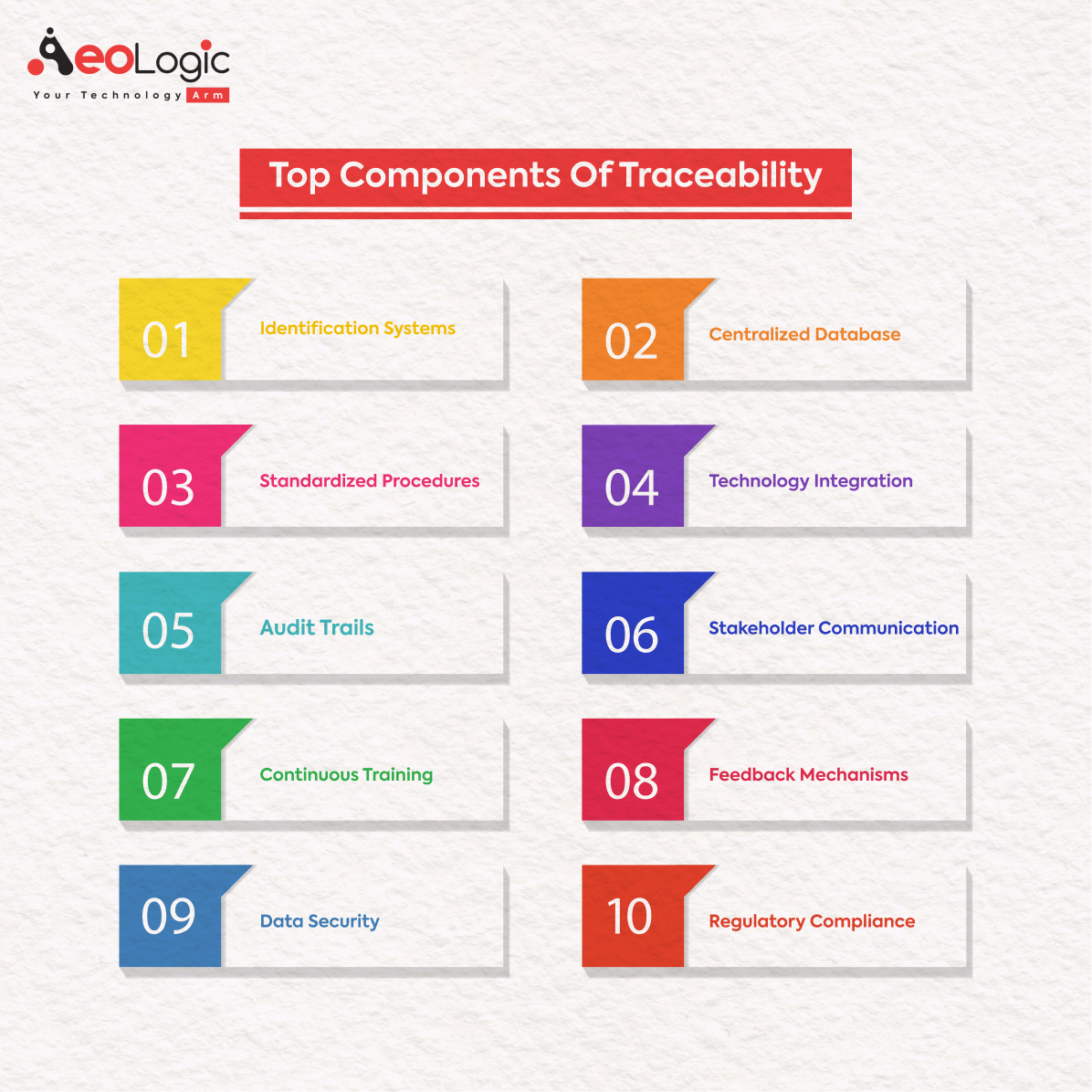You’ve probably been in a situation where you’re trying to track the history of a product, a process, or even a piece of software. You’re trying to figure out where it came from, who worked on it, and what changes were made along the way. Enter traceability. In this article, we’ll delve into the concept of traceability, why it’s so crucial, and how you can achieve it in various contexts. So, buckle up, and let’s embark on a traceability journey!
What is Traceability?
In its simplest form, traceability refers to the ability to trace the history, application, or location of an entity by means of recorded identifications. It’s like a breadcrumb trail that lets you retrace your steps back to the starting point.
Also Read our trending blog: Traceability Solutions for Supply Chains with Examples
Top Components of Traceability

Traceability might sound like a straightforward concept, but achieving it requires a mix of tools, techniques, and strategies. Let’s delve into the top components that play a pivotal role in ensuring effective traceability:
1. Identification Systems
Whether it’s barcodes, QR codes, RFID tags, or serial numbers, having a unique identifier for each item or batch is the first step to traceability.
2. Centralized Database
A unified database that stores all relevant information ensures that data can be easily accessed, analyzed, and retrieved when needed.
3. Standardized Procedures
Uniform processes and procedures across the board ensure that traceability is maintained consistently, regardless of who is handling a product or process.
4. Technology Integration
Integrating various traceability tools and software with other business systems, like ERP or CRM, provides a holistic view and streamlines operations.
5. Audit Trails
A system that logs every action, change, or movement ensures that you can retrace steps accurately and identify any discrepancies.
6. Stakeholder Communication
Effective communication channels with suppliers, distributors, and consumers ensure that everyone is on the same page regarding traceability standards and expectations.
7. Continuous Training
Keeping employees updated with the latest in traceability standards, tools, and best practices ensures that the system remains robust and up-to-date.
8. Feedback Mechanisms
Implementing systems to gather feedback from both internal stakeholders and end consumers can provide insights into potential areas of improvement.
9. Data Security
Ensuring that traceability data is secure from potential breaches or unauthorized access is crucial to maintain the integrity of the system.
10. Regulatory Compliance
Staying updated with local, national, and international traceability regulations and ensuring compliance safeguards the business from potential legal issues.
By understanding and implementing these components, businesses can build a robust traceability system that not only meets regulatory requirements but also boosts consumer trust and confidence.
Also Read: Challenges and Opportunities in the Traceability of Medicinal Products
Some Interesting Statistics:
- According to a study by the Food Marketing Institute, 75% of consumers are more likely to buy a product if they know where it comes from [source: Food Marketing Institute].
- A report by the World Quality Report found that improving traceability was a top priority for 65% of businesses surveyed [source: World Quality Report].
From these statistics, it’s clear that whether it’s for consumers or businesses, traceability is of paramount importance.
Also Read: The Role of Traceability in the Textile Industry
Why is Traceability Important?
In our journey to understand traceability, it’s essential to grasp why it holds such significance in various domains. From ensuring accountability to optimizing processes, traceability plays a pivotal role in enhancing operations and building trust. Let’s explore the reasons behind its importance:
1. Accountability
In any given process or system, multiple entities—be it individuals, teams, or even machines—play a role. Traceability ensures that every step taken or decision made is documented. This means that if something goes wrong or if there’s a need to understand a particular decision, it’s easy to identify who or what was involved. This cultivates a culture of responsibility where each entity knows that their actions are traceable and, as a result, they are more likely to act with due diligence.
2. Quality Control
Mistakes happen. However, with traceability, these mistakes can be identified quickly and rectified. By tracing back through processes or systems, it becomes easier to pinpoint where a defect or issue originated. This not only allows for swift resolution but also helps in analyzing patterns, understanding if a particular step is consistently problematic, and making necessary adjustments to enhance quality.
3. Consumer Trust
Today’s consumers are more informed and discerning than ever. They want to know where their food comes from, how their products are manufactured, and the ethics behind brands they support. Traceability provides this transparency. When consumers can trace the journey of a product or service, it instills confidence and trust in the brand, making them more likely to purchase and stay loyal.
4. Regulatory Compliance
Certain industries are governed by strict regulations to ensure safety, ethics, and quality. For instance, the pharmaceutical industry needs to ensure that drugs are safe and effective, while the finance sector has to ensure data privacy and transparency. Traceability helps businesses in these sectors maintain a clear record of their processes and systems, ensuring they meet the required standards and can provide evidence of compliance when required.
Also Read: What is Traceability and Its Challenges in Industry
5. Efficiency and Cost Savings
At first glance, setting up traceability might seem like an added cost. But in reality, it’s an investment with significant returns. With traceability, businesses can identify inefficiencies in their processes—be it a redundant step that’s wasting time or a recurrent defect that’s leading to product returns. By addressing these early on, businesses can save on costs in the long run. Moreover, in industries where recalls are a possibility, traceability can prevent such costly endeavors by quickly identifying and addressing issues before they escalate.
Achieving Traceability in Different Sectors
In our interconnected world, every sector faces unique challenges that traceability can address. From the food on our plates to the apps on our phones, knowing the origin and journey of products and services is more crucial than ever. Let’s dive into how different industries harness the power of traceability to ensure quality, transparency, and trust.
1. Food Industry
In the age of globalized food chains, knowing what’s on your plate means tracing its journey from farm to fork. The food industry heavily relies on traceability to ensure the safety and authenticity of its products.
- Farm to Table: By maintaining a record of the entire supply chain, from the farm where an ingredient was grown to the store where the final product is sold, companies can ensure the quality and safety of their products.
- Barcodes and QR Codes: These can provide consumers with detailed information about a product’s origin, processing, and other relevant details with just a quick scan.
2. Manufacturing
Manufacturing is a multifaceted process with many moving parts. Keeping track of each component, its origin, and its journey through the manufacturing process is pivotal for quality assurance and customer satisfaction.
- Batch Numbers: Assigning unique batch numbers to products allows for easy recall in case of defects.
- Supplier Records: Keeping detailed records of suppliers ensures the quality of raw materials and components.
3. Software Development
Software development is all about iterations and improvements. As software evolves, it’s crucial to keep track of changes to ensure stability, security, and functionality.
- Version Control Systems: Tools like Git allow developers to track changes made to software code over time, making it easier to identify and fix bugs.
- Documentation: Detailed documentation of software development processes helps in understanding the evolution of a software product.
4. Healthcare
Healthcare is an industry where precision and accuracy can literally mean the difference between life and death. Tracking patient histories, treatments, and medications is of utmost importance.
- Patient Records: Maintaining detailed patient records ensures that healthcare providers have all the necessary information to provide the best care.
- Drug Traceability: Tracking the production and distribution of drugs ensures their quality and safety.
5. Fashion and Apparel
Fashion isn’t just about style; it’s also about ethics and sustainability. As consumers become more conscious of their choices, brands are leveraging traceability to ensure responsible sourcing and manufacturing.
- Source of Materials: Brands can use traceability to verify and communicate the source of their materials, ensuring ethical and sustainable practices.
- Supply Chain Visibility: By tracking each stage of clothing production, from raw material sourcing to final product sale, companies can ensure quality and compliance with labor standards.
6. Finance and Banking
In a world of digital transactions and global finance, traceability ensures the integrity and security of every financial move. Banks and financial institutions utilize traceability tools to safeguard their operations and client trust.
- Transaction History: Banks maintain a detailed log of all transactions, allowing for easy tracking and verification.
- Audit Trails: In financial systems, an audit trail ensures that any changes to financial data can be traced back to its source, ensuring data integrity and compliance with regulations.
Final Words
Traceability is a crucial aspect of quality control, accountability, and consumer trust in various sectors. By understanding its importance and implementing the right tools and processes, businesses can ensure that they remain transparent, accountable, and trustworthy in the eyes of their stakeholders.
Remember, in a world overflowing with information and choices, traceability offers a clear path back to the source. Whether you’re a consumer trying to make an informed choice or a business trying to stand out, traceability is the key to unlocking trust and quality. So, the next time you’re wondering about the journey of a product or a piece of information, think about traceability.
Ready to elevate your traceability game? Connect with Aeologic Technologies now and let’s craft your success story together!









